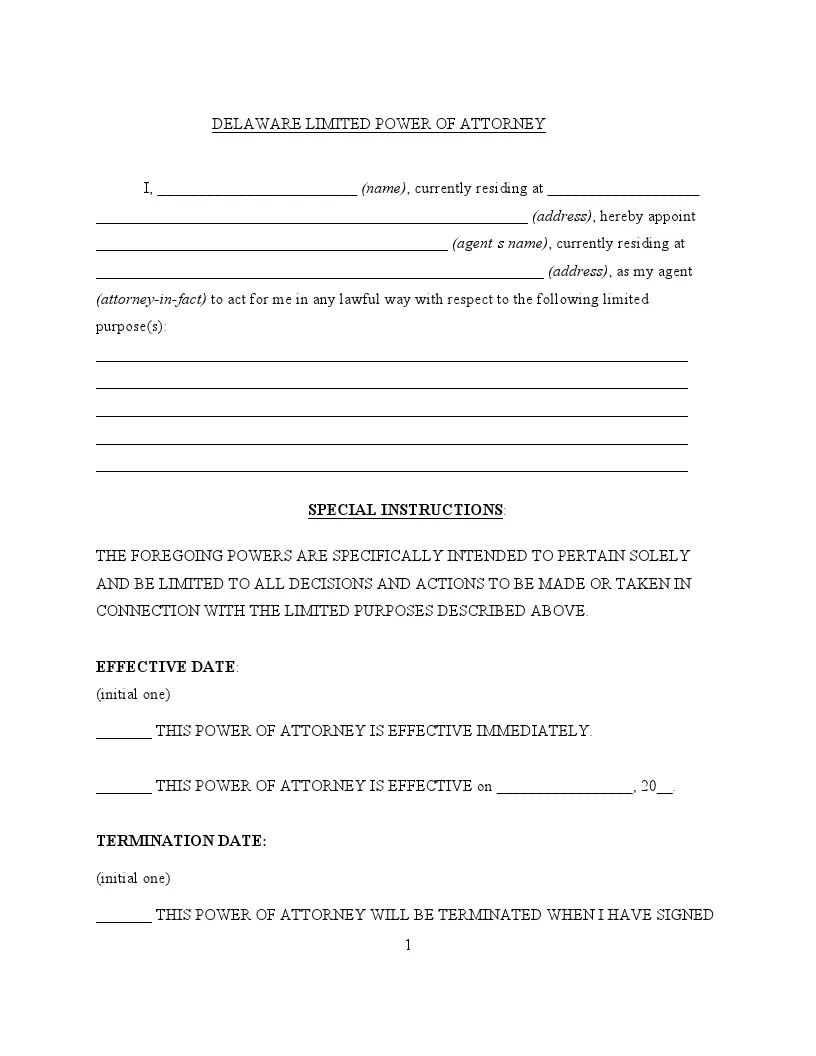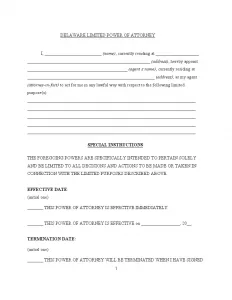Delaware Limited Power of Attorney Form
A Delaware limited power of attorney is a legal document that allows a person to appoint someone else to act on their behalf in specific circumstances. The person granting the authority is called the principal, and the agent (or attorney-in-fact) is the one who acts on their behalf. This tool manages precise personal, financial, or legal aspects without relinquishing overall authority.
Unlike a general power of attorney, which grants broad powers to the agent, a limited power of attorney is restricted to specific tasks, situations, or periods. It could involve handling financial transactions or managing real estate properties, but only under certain conditions or at specific times. Limited power of attorney in Delaware is used when the principal cannot manage some affairs due to other commitments or health issues but does not need to hand over complete control. Consider other Delaware power of attorney forms to give your agent broader authority.

Build Your Document
Answer a few simple questions to make your document in minutes
Save and Print
Save progress and finish on any device, download and print anytime
Sign and Use
Your valid, lawyer-approved document is ready
When creating a limited power of attorney, you must follow the specific signing requirements outlined in the Delaware Code to validate the document:
According to the statute, the principal must sign the document.
- Under § 49A-105, the principal must sign the document in the presence of a witness and have it notarized.
- § 49A-201 allows the agent to act with limited authority, strictly defined by the terms of the power of attorney.
- The principal can revoke the power of attorney, as detailed in § 49A-110, provided they are competent.
These rules are essential to ensure that the agent operates within the limits set by the principal and that the principal can change those limits as needed. Following these guidelines is necessary to create a legally valid document in Delaware.
Delaware Limited Power of Attorney Form Details
| Document Name | Delaware Limited Power of Attorney Form |
| Other Name | Delaware Special Power of Attorney |
| Relevant Laws | Delaware Code, Section 49A-201 |
| Avg. Time to Fill Out | 8 minutes |
| # of Fillable Fields | 32 |
| Available Formats | Adobe PDF |
Filling Out Delaware Limited POA
Here’s a step-by-step guide on how to fill out a Delaware limited power of attorney. This form allows you to grant specific powers to an agent to act on your behalf in specific matters.
1. Enter Your Information
Please fill in your full name and mailing address at the top of the form where it says, “I, currently residing at.” Make sure the city and state are also included.
2. Designate Your Agent
Enter the full name and mailing address of the person you appoint as your agent in the spaces provided. This individual will have the authority to act on your behalf in the matters specified in the document.
3. Specify the Powers Granted
Detail the specific powers you are granting to your agent. You must be clear and precise about what the agent is authorized to do, ensuring these powers are legally permissible.
4. Acknowledge the Terms
Review the section that outlines the terms of the agreement, including the effective date and the conditions under which the power remains valid or can be revoked. This part does not require any input but should be read carefully.
5. Sign and Date the Form
Sign your name at the bottom of the form and print it next to your signature where indicated. Fill in the date on the line provided.
6. Witness Signing
Have a witness sign the form and print their name. The witness must swear they are not related to you by blood, marriage, or adoption and have no entitlement to any portion of your estate. This step is critical as it adds a layer of legal protection and validity.
7. Notarization
Take the completed form to a notary public. The notary will fill out the “State Of Delaware” section verifying that you acknowledged the form before them. The notary will also sign and indicate when their commission expires.
